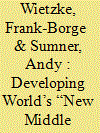| Srl | Item |
| 1 |
ID:
159484


|
|
|
|
|
| Summary/Abstract |
Rapid middle-income growth over the past decades has led to increasing public interest in the developing world’s “new middle classes”. However, these transformations have received less attention in the comparative democratization and welfare-state regime literature. In this review article, we aim to fill this gap by identifying emerging evidence and new directions for research about the social and political consequences of lower-middle income growth. We note that, while socio-cultural and political transformations traditionally associated with expanding middle classes are unlikely to materialize at current levels of socio-economic wellbeing in most developing countries, new pressures for reform may arise out of demands to better protect modest increases in private assets and from improved educational outcomes among lower-middle income groups. We also identify signs of increased distributional conflicts between economically vulnerable lower-middle income groups and more-affluent middle classes that may undermine the transition to stable democracy and more inclusive social policy systems.
|
|
|
|
|
|
|
|
|
|
|
|
|
|
|
|
| 2 |
ID:
078257


|
|
|
|
|
| Publication |
2007.
|
| Summary/Abstract |
This article explores a so far neglected dimension of the ongoing debate on the relationship between the politically contested position of the ethnic Chinese and their dominant role in the economies of Southeast Asia in general and in Malaysia in particular. While the prominence of the ethnic Chinese in the business life of Malaysia is ubiquitous, they also seem to be the engine of the striking growth of the Christian community, in particular the Pentecostal-Charismatic groups. This 'charismatic turn', it has been argued, reflects a major shift in the social position and power relations among the ethnic groups and the consolidation of the position of the Malaysian Chinese in the modern Malaysian nation state. This article critically reappraises this 'empowerment thesis' by analyzing the opportunities that conversion to Christianity and membership of Pentecostal-Charismatic groups offer to Malaysian Chinese business people, managers and professionals. In particular, this article identifies the forms of capital (in a Bourdieuan sense) involved and analyzes how these forms of capital are utilized and imbued with meaning in the interface of religion and business
|
|
|
|
|
|
|
|
|
|
|
|
|
|
|
|